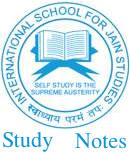
Mantras and ‘My Prayer’ (Meri Bhāvanā by Pt. J.K.Mukhatara)
Jains do have a number of mantras, which both the laity and monks use regularly to meditate or observe as a ritual to take themselves away from daily routine and pay respect to the auspicious beings or to pray for fulfillment of their desires. The most potent mantras of Jains are called Navakāra and Catūħ śaraņa that is common to all sets and shades of Jains. The main difference between Jain mantras and others is that Jains pay obeisance to the virtues and the people who have either become virtuous or are practicing the path of spiritual purification on a full time basis to become virtuous. In this paper we shall understand the two mantras and their significance.
Jains believe in autosuggestions and contemplations to purify their thought, mind and attain beneficence. Similar to mantras, Jains have a very popular prayer, which is sung or recited either individually or in groups almost daily. Pandit Jugal Kishore Mukhtar had beautifully composed Meri Bhāvanā or my prayer. It has a collection of eleven verses of 4 lines each in simple and easy to understand in Hindi language. These eleven verses can be identified to convey the following suggestions for self as well as others benefits.
Verse | Content |
1 | Identify the true nature of auspicious/ supreme beings |
2 | Nature of the true monks /spiritual leaders |
3 | Suggestion to myself for self improvement |
4 | Do |
5 | Do |
6 | Do |
7 | Selflessness |
8 | Equanimity |
9 | Prayer/ expectations from others. |
10 | Do |
11 | Benefits of the prayer. |
In this prayer we will find our involvement in worldly affairs in a righteous way as well as maintaining a distance from the same so as not to be too involved in them.
Mantras
Navakāra:
Ņamo arihantāņam
Obeisance to the perfect beings with body
Ņamo siddhāņama
Obeisance to the liberated souls
Ņamo āyariyāņama
Obeisance to the heads of congregation
Ņamo uvajjhāyāņama
Obeisance to the holy teachers
Ņamo loye savvesāhuņama
Obeisance to all the holy monks
Catūħ Śaraņas:
Cattāri mańgalań, arhanta mańgalań, siddha mańgalań.
Sahu mańgalań, kevalipaņņatto dhammo mańgalań
Cattāri logūttama, arahanta logūttam, siddha logūttama,
sahu loggūttama, kevalipaņņatto dhammologūttamo.
Cattāri saraņań pavvajjāmi. Arahanta saraņań pavvajjāmi.
Siddhe saraņań pavvajjāmi, sahu saraņań pavvajjāmi,
kevalipaņņatto dhammo saraņań pavvajjāmi.
Meaning:
- There are four auspicious beings namely arahantas (perfect beings with body), siddhas (liberated souls), holy monks (sādhus) and dharma (religion) described by omniscient lords. May they be auspicious to me?
- There are four most beneficial beings in this world, namely arahantas (perfect beings with body), siddhas (liberated souls), sādhus (holy monks) and dharma (religion) described by omniscient lords. May they be beneficial to me?
- I dedicate myself to these four beings namely arahantas (perfect beings with body), siddhas (liberated souls), holy monks (sādhus) and dharma (religion) described by omniscient lords.
My prayer / Meri Bhāvanā by Pt. J.K.Mukhatara
1
Jisne rāga dveşa kāmādika jīte saba jaga jāna liyā
Saba jīvo ko Mokşa mārga kā nisprha ho updeśa diyā
Buddha Vīra Harī Har Bŗhamā yā usko svādhīna kaho
Bhaktibhāva se prerita ho yā citta usī meń lina raho.
Meaning:
He, who has destroyed or subdued his attachment, aversion, desires and had understood the reality of this universe; who delivers the sermons to every body about the path of spiritual purification and attaining liberation; who may be called by different names such as Buddha, Vira, Hari, Hara and Brahma or the self/ soul; Imbued with devotion in Him, may this mind be eternally engrossed in Him.
2
Vişayo kī āśā nahi jinake sāmya bhāva dhana rakhate heń
Nija para ke hita sādhana me niśa din tatpara rahate heń
Svārtha tyaga ki kathina tapasyā binā kheda jo karate heń
Ese jňānī sādhu jagat ke dukhaħ samuha ko harate heń.
Meaning:
They, who have overcome the desire for sensual pleasures and maintain the state of equanimity; they are engrossed everyday in the welfare of others as well as their own; they practice the hard penance of selflessness; such knowledgeable ascetics (they) conquer /overcome the pains of mundane worldly existence.
3
Rahe sadāsatsańga unhī kā dhyāna unhīkā nitya rahe
Unhī jaisī caryā meń yaha citta sadā anurakta rahe
Nahī satāu kisi jīva ko jhuta kabhī nahī kahā karuń
Paradhana vanitā para na lubhāuń santośāmrta piyā karūń
Meaning:
May I always associate with such holy ascetics; may my mind be occupied in their life style; may I never cause pain to any living being nor tell a lie at any time; may I never be attracted towards the wealth or women of others and hence feel contented all the time.
4
Ahańkāra kā bhāva na rakkhu nahī kisī para krodha karūń
Dekha dusro kī bathtī ko kabhi na īrşā bhāva dharūń
Rahe bhāvanā esī merī sarala satya vyavahāra karūń
Bane jahā taka esa jīvana meń auro kā upakāra karūń
Meaning:
May I never a feeling of ego / pride nor get angry with anyone; May I never feel envious / jealous on seeing the progress of any one; May I develop a balance, straight and simple, fair and honest feeling towards all; may I be good in my behavior towards all to the utmost level of my capabilities.
5
Maitrī bhāva jagata meń merā saba jīvo se nitya rahe
Dīna dukhī jīvo para mere ura se Karūņā stotra bahe
Dūrjana krūra kūmārgarato pera kşobha nahī mūjha ko āve
Sāmyabhāva rakhuń meń una para esī parinatīho jāve
Meaning:
May I always maintain a feeling of friendship towards all living beings; May the spring of compassion always flow for those who are in pain and are suffering; May I never get angry with those whoa re bad cruel and wrongly directed people; May I maintain a sense o equanimity while dealing with such persons.
6
Gūņi jano ko dekha hŗdaya meń mere prema umada āve
Bane jahā taka unaki sevā karake yaha mana sūkha pāve
Houn nahi kŗataghna kabhi main dŗoha na mere ura āve
Gūņa grahaņa kā bhāva rahe nita dŗşţi na doşo para jāve.
Meaning:
May my heart overflow with love at the very sight of virtuous people; May I derive pleasure and happiness in serving these people as much as possible; May I never become ungrateful nor feel jealous of any one; May my longing be always for assimilating the virtues of others and never look at their vices.
7
Koi būrā kaho yā ācchā lakşami āve yā jāve
Lākho varşo taka jiuń yā mŗtyū āja hī ājāve
Athavā koī kaisa bhi bhaya yā lālaca dene āve
To bhī nyāya mārga se merā kabhī na paga digane pāve.
Meaning:
Whether people speak good or ill of me or the wealth comes to me or leaves me; whether I live for thousands years or die even today; whether anyone allures me with worldly riches or scares me in any way; I pray that I do not leave the path of just in any of the these situations.
8
Hokara sūkha meń magana na fule dūkha meń kabhi na ghabarāve
Parvata nadi samaşāna bhayānaka aţavi se na bhaya khāve
Rahe adola akampa nirantara yaha mana draţhatara bana jāve
Işţa viyoga inaişţa yoga meń sahana śīlatā dhikhalāve
Meaning:
May my mind neither be overwhelmed with happiness on having comforts nor become worried on having pains; May I never be scared of the sight of dangerous mountains, river, pyres in the cremation grounds; May it become calm, composed continuously and become stronger and stronger; May I display / experience tolerance in favorable or unfavorable situations alike.
9
Sūkhi rahe saba jīva jagata ke koī kabhī na ghabarāve
Baira pāpa abhimāna coda jaga nitya naye mańgala gāve
Ghara ghara carca rahe dharma ki dūşkrata dūşkara ho jāve
Jnāna caritra unnata kara apnā manūja janma fala saba pāve.
Meaning:
May the happiness be the lot of all and nobody distress never bother anyone; May ever one experience auspicious feelings every day by giving up animosity, sins and pride/ego; May the discussions of religious exist in all households and the inauspicious events be destroyed; My every one realize the highest attainment of life by enhancing their wisdom and conduct.
10
īti bhīti vyāpe nahi jaga meń vrşţi samaya para hūā kare
Dhamanişţha hokara rājā bhi nyāya prāja kā kiyā kare
Roga mari dūrbhikşa na faile prajā śānti se jiyā kare
Param Ahińsā dharma jagata men faila sarvahita kiyā kare
Meaning:
May distress and suffering no longer exist and may it rain on time; May the king be righteously inclined and do justice to all his subjects; May the diseases, epidemics and famine cease to spread and exist; May Ahińsā pervade the entire universe and bring benevolence to all.
11
Faile prema parapara jaga meń moha dura para rahā kare
Apriya kaţuka kaţhora sabda nahi koi mūkha se kahā kare
Banakara saba yūga-vira hrdaya se deśonnati rata rahā kare
Vastu svarūpa vicāra khūśi se saba dūkha sańkaţa sahā kare.
Meaning:
May mutual love spread through out the world and delusion stay at a distance from all; May no one use harsh, bitter and unpleasant words from their mouths; May everyone become the hero of his time and work for the progress of his country; May all understand the true nature of entities / substances and hence become tolerant of all sorts of pains inflicted.
 Dr. Shugan Chand Jain
Dr. Shugan Chand Jain